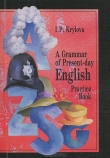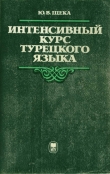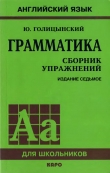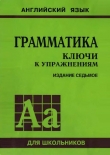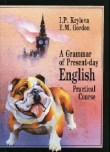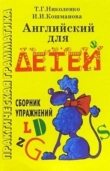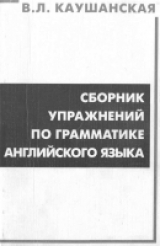
Текст книги "Сборник упражнений по грамматике английского языка"
Автор книги: Валентина Каушанская
Жанры:
Учебники
,сообщить о нарушении
Текущая страница: 10 (всего у книги 20 страниц)
Exercise 10. Translate into English, using the emotional should.
(A)
Based on an episode from Oliver Twist by Ch. Dickens.
1. «Как странно, что Оливер не вернулся, – сказал мистер Браунлоу.—Мне грустно думать, что мальчик обманул меня». 2. «Совершенно естественно, что Оливер убежал от вас; он, должно быть, вернулся к своим старым друзьям, – ответил мистер Гримвиг. – Зачем ему возвращаться к вам, ведь у него ваши деньги и книги?» 3. «Стыдно вам так плохо думать о ребенке, ведь вы его совсем не знаете, – возразил мистер Браунлоу. – Не может быть (it is impossible), чтобы он украл мои деньги и книги, я этому не верю». 4. «Как бы вам это ни было неприятно, вам придется поверить, – продолжал мистер Гримвиг. – Мне очень жаль, что вы так обманулись в ребенке», (to be disappointed in somebody)
(
B
)
1. «А вы его любите?» – «Он хороший человек; отчего же мне его не любить?» (Тургенев) 2. Не понимаю, зачем тебе нужно мучить меня? (Л. Толстой)3. «Я нахожу только странным, что женщины ищут новых обязанностей, – сказал Сергей Иванович, – тогда как мы, к несчастью, видим, что мужчины обыкновенно избегают их». (Л. Толстой) 4. Нет, почему же тебе не приехать?.. Жена ждет тебя. Пожалуйста приезжай. (Л. Толстой)5. Она и всегда рада ему была, но теперь особенно рада была, что он видит ее во всей ее славе. (Л. Толстой)6. Почему же не попробовать своего счастья?., (to try one's luck). (Пушкин)
Exercise 11. Insert the appropriate form of the Subjunctive Mood. Comment on the form and the use of the Subjunctive Mood. Translate into Russian.
1. Strickland was certainly forty, and I thought it disgusting that a man of his age __ himself with affairs of the heart, (to concern) (Maugham)2. He brightened as if he __ a gift. (to. receive) (Lawrence)3, I wish you __ me alone now. (to leave) (Dreiser) 4. It's time I __ it out again from the beginning, (to think) (Snow) 5. When I suggested that he __ to bed he said he could not sleep. (to go) (Maugham)6....glancing sidelong at his nephew, he thought: «I wish I __ his age!» (to be) (Galsworthy)7. If I __ you and __ going to be a banker, I __ first __ a year or so in some good grain and commission house, (to be, to be, to spend) (Dreiser) 8. «God __ us always,» I said, «from the innocent and the good.» (to save) (Greene)9. She held her baby up to the window that she __ the pretty silvery tinkle of the little bells on the pagoda, (to hear) (Buck)10. She had a conviction that, long as she __, her aunt would live at least as long, and always retain her brilliancy and activity, (to live) (James)11. The arrangement was that Miss Everdene __ them by coming there for a day or two... (to honour) (Hardy)12. She was by now feeling so happy that she __ for joy if it __ for the delicious spell which she felt herself to be under and which still enjoined silence, (to shout, to be – negative) (Murdoch) 13. Why __ he __ the one to hurt her, when really he had wanted to be her friend from the beginning? (to be) (Saroyan)14. For a fortnight it was necessary that someone __ with him all night, and she took turns at watching with her husband, (to stay) (Maugham)15. Lady Bracknell, I admit with shame that I do not know. I only wish I __ (to do) (Wilde)16. Hunter was anxious that a certain person __ it. (to see – negative) (Murdoch)17. Except for the unexpectedly sad lines which ran from his nose to the corners of his mouth he __ like a boy. (to look) (Mailer) 18. Her face looked strange, as if she __ to cry and __ how. (to want, to forget) (Galsworthy)19. But I still don't begin to understand why these people, however silly they __ about their beliefs, __ ready to risk murder, (to be, to be) (Priestley) 20. They were a pleasant pair, and I told myself it was far better that Avice __ him than Roger. (to marry) (Snow)21. Heaven __ me, I left you alone with that scoundrel, (to forgive) (Shaw)22. Mrs. Mann gave him a piece of bread-and-butter, Test he __ too hungry when he got to the work-house. (to seem) (Dickens)23. He was still puffing and blowing as if he __ just __ a mile, (to run) (Priestley) 24. I regret to say, Miss Chiltern, that I have no influence at all over my son. I wish I __.. If I __, I know what I __ him do. (to have, to have, to make) (Wilde)25. «I want to marry Aileen,» Cowperwood repeated, for emphasis' sake. «She wants to marry me. Under the circumstances, however you __, you can have no real objection to my doing that, I am sure.» (to feel) (Dreiser)26. Besides, it's high time you __ down, (to settle) (Maugham)27. Sir Gregory Hatchland was a poor public speaker,... but he had seen to it that there – some good speakers on the platform, (to be) (Priestley) 28. She ran down to her cabin that she __ the ship pulling away and widening the chasm between her and her beloved shore, (to see – negative) (Buck) 29. I wish you __ me. (to interrupt – negative) (Maugham)30. There had been a time when I __ surprised to see girls like Avice and Tonia drink spirits, but I had come to accept it as another of the things which are inevitable in these troubled days of ours – and I could not see any possible reason why they __ whisky if they liked it. (to be, to drink – negative) (Snow)31. Far __ it from me to marry any woman on account of her money, (to be) (Trotlope)32. Your father tells me you think highly of his accomplishments whatever they __ (to be) (Lindsay)33. A little Jater Fox suggested that he __ her a monthly allowance, in addition to the rent of the room, (to pay) (Murdoch)34. She __ to bed last night just as if nothing __ if I __ her. (to go, to happen, to let) (Shaw)35. She [Aileen] was greatly outraged to think you __ detectives on her trail, (to put) (Dreiser)36. Perhaps, if such a thing __ again, Mrs. de Winter will tell me personally? (to happen) (Du Maurier)37. It seemed to me important that the weather __, not the least cloud __ on the horizon; I was almost frightened to stare too long at the colour of the water lest it __ or darken by the least degree, (to change – negative, to appear, to dull) (Hansford Johnson)38. He wished now that he __ to look at. Fleur's portrait; it __ him something to talk of. (to stop, to give) (Galsworthy)39. My people told me this story about the man so that I __ what a fool he was and not be like him. (to understand) (Saroyan)40. I am feeling very drowsy, and it is time I __ to bed. (to go) (Maugham)41. As she spoke to me she was glancing about the bar, her gaze hopping from one face to the next, as if it __ imperative that she __ nothing of what was going on in a shrivelling world, no matter how trivial it __ (to be, to miss, to be) (Hansford Johnson)42. I wish you __ with your work instead of interrupting me all the time, (to get on) (Maugham)43. Why __ there __ one law for men, and another for women? (to be) (Wilde)44. She proposed that in a little while she and 1 __ married, (to get) (Coppard)45. Anything's better than to sit there as if you __ you __ a thousand miles away, (to wish, to be) (Shaw)
Exercise 12. Translate into English, using the Subjunctive Mood. (Based on an episode from David Copperfield by Ch. Dickens.)
1. Мисс Мердстон держала себя так, словно она была хозяйкой дома, словно она прожила там всю свою жизнь. 2. Она обращалась с миссис Копперфильд, как будто та была ребенком и совсем не знала жизни. 3. «Вам давно пора отдать ключи моей сестре», – сказал мистер Мердстон жене. 4. Мистер Мердстон не раз говорил, что очень важно, чтобы миссис Копперфильд была строга с Давидом. 5. Миссис Копперфильд никогда не ласкала Давида в присутствии мужа, чтобы не рассердить его. 6. «Странно, что мисс Бетси ни разу не написала нам, – сказала Пеготти. – Не может быть (it is impossible), чтобы она совсем забыла нас». 7. «С какой стати она будет нам писать? – возразила миссис Копперфильд. – Она не любит ни меня, ни моего ребенка!» 8. Мистер Мердстон просил сестру посмотреть за тем, чтобы Давид не был так часто в обществе Пеготти. 9. Давид боялся, как бы мистер Мердстон не увидел, что он пошел на кухню к Пеготти. 10. «Что бы ни говорила миссис Копперфильд, я знаю, чтб она несчастна»,—думала Пеготти. 11. Мистер Мердстон настаивал на том, чтобы его жена уволила Пеготти. 12. «Как бы меня ни уговаривал мистер Мердстон, я ни за что не уволю Пеготти»,—думала миссис Копперфильд. 13. «Если бы случилось так, что Пеготти ушла от нас, наша жизнь стала бы невыносимой»,– думал Давид. 14. Как ни горячо (dearly) любила Давида миссис Копперфильд, она допустила, чтобы с ним плохо обращались. 15. Давид знал, что как бы он ни старался, он не сможет хорошо ответить уроки в присутствии отчима. 16. Давид боялся, как бы миссис Копперфильд не сочла его дурным и ленивым мальчиком. 17. «Как жаль, что матушка вышла замуж за мистера Мердстона, – не раз думал Давид. – Если бы не он, мы были бы очень счастливы». 18. В Салемской школе (Salem House) Давид чувствовал себя очень одиноким. «Как бы я хотел быть сейчас дома с матушкой и Пеготти», – часто думал он. 19. После смерти миссис Копперфильд Пеготти предложила, чтобы Давид поехал с нею в Ярмут. 20. Пеготти взяла мальчика в Ярмут, чтобы он отвлекся там от своих печальных мыслей (to divert oneself from something).
Exercise 13. Insert should or would and state whether they are auxiliary or modal. Translate into Russian.
1. She smiled; her smile was really very sweet, and she blushed a little; it was singular that a woman of that age __ flush so readily. (Maugham) 2. He glanced at Sir Edgar, but the old man __ not share the joke. (A. Wilson)3. Richard proposed that we all __ go to London together. (Dickens)4. He saw a thousand things he __ have done, but had not done. (Jones) 5. It is no use, I fear, to ask Tod; but of course if he __ come too, botb Stanley and myself __ be delighted. (Galsborthy)6. I wish you __ not talk about that, Father. (Dreiser)7. Her eyes were fixed on Lady Arabella, and her position seemed to say that it was time that her ladyship _ go. (Trollope)8. At the gate of Huntercombe whom __ they meet but Compton Bassett, looking very pale and unhappy? (Reade)9. It was lonely! A woman in the room __ have made all the difference. (Galsworthy)10. I asked him one or two questions, but he __ not answer. (Maugham)11. I wish you – not talk like that. (Hardy)12. He looked more than ever out of place: he __ have stayed at home. (Greene)13. I went to my bureau, with a sort of haste and trembling lest Madame __ creep upstairs and spy me. (Ch. Bronte)14. You see that it is necessary that he __ pay us a visit, don't you? (Shaw)15. Why __ you expect her to act as you __ act yourselves? (Galsworthy)16. Now again he had forgotten that unemployment was not a mark of the lazy man; that the beggar did not beg because he __ not work. (Greene)17. She promised to inform him if anything important __ occur. (Reade)18. In his weary and hungry state, he __ never have come here. (Dreiser)19. Please, say to Mr. Townsend that I wish he __ leave me alone. (James)20. It is most important that you __ be good. (Shaw)21. He hesitated. «It's queer that you __ be treating me like this, like a friend.» (Greene)22. During I the year she was sent to a Chinese boarding-school where she was given
an education in her own language, for Carie __ not sepa– rate the child from her own people. (Buck)23. I was thinking angrily of Roger. He __ have broken the news himself. (Snow) 24. He says, naturally enough, that it is absurd that he __ be asked to provide for the children of a man who is rolling in money. (Shaw)25. I swore that I forgave her everything, but she __ not listen. (Maugham)
Exercise 14. Comment on the Subjunctive Mood and modal verbs. Translate into Russian.
1. There was no immediate answer, but presently I heard my name again, in a tone so very mysterious and awful, that I think I should have gone into a fit, if it had not occurred to me that it must have come through the keyhole. (Dickens)2. As he walked along the north side of a certain street, what should he see but the truly beautiful and remarkable eyes of Mr. Angelo. (Reade)3....you should never neglect a chance, however small it may seem. (Conan Doyle)4. I hope he may not return here just yet. I pray God he may not come into my sight, for I may be tempted beyond myself. (Hardy)5. Annette sighed. If Nicholas were only here, he would advise her. As he was not here, should she confide in Rosa? That was the question. (Murdoch)6. Harper Steger... walked always as though he were a cat and a dog were! prowling somewhere in the offing. (Dreiser)7. It was as if she had received a physical blow and were rocking on her feet. (Heym)8. She had suggested that Abraham arrive precisely at one-thirty. (Stone)9. If 1 were to die—and I may die soon—it would be dreadful that you should always think mistakenly of me. (Trollope) 10. She strove to ensnare him with comfort and would not see that comfort meant nothing to him. (Maugham)11. I wished he would not always treat me as a child. (Du Maurier)12. It is likely that except for the instruction of his grandfather, Karl himself would now be more like the other children. He would not have the military manner of walking which is the chief difference between him and the other children. (Saroyan)13. He proposedto change his will to the effect that his collection should be bequeathed to the city only on certain conditions, the most important of which was that I should be retained as curator. (Hansford Johnson)14. His spirits fell, however, when, upon reaching the park, he waited and waited and Carrie did not come. Could something have happened out there to keep her away? (Dreiser)15. I never saw a man so hot in my life. I tried to calm him, that we might come to something rational; but he got hotter and hotter, and wouldn't hear a word. (Dickens)16. I think you might have the decency to treat me as a prisoner of war, and shoot me like a man instead of hanging me like a dog. (Shaw)17. At lunch she did not tell Michael she was going – he might want to come, too, or at least to see her off. (Galsworthy)18. It's odd, bethought, very odd; I must be mistaken. Why should he have followed me this distance? (Greene)19. My only terror was lest my father should follow me. (Eliot)20. But I find now that you left me in the dark as to matters which you should have explained to me years ago. (Shaw)21. Tony must have had several drinks by the time Erik arrived, and he insisted that Erik join him in still one more. (Wilson)22. It would be monstrously selfish if I disturbed a state of things which is eminently satisfactory to you both. I will not come between you. (Maugham)23. You shall smart for this!.. You shall rue it to the end of your days. (Conan Doyle)24. And I will arrange that the funeral shall take place early tomorrow. (Hardy)25. Your husband shall be treated exactly as if he were a member of the royal family. No gratitude, it would embarrass me, I assure you. (Shaw)26. He felt as if something in him were collapsing. (Heym)27. I am sure this William Wallace is a fine fellow... but I can't see why my daughter should marry without even sending me an invitation to the wedding. (Stone)28. Stener was to be sentenced the maximum sentence for his crime in order that the party and the courts should appear properly righteous. (Dreiser)29. Vincent knew that his sketches from life were not all what they should have been; but he was confident that if he worked hard they would come right in the end. (Stone)30. An old gentleman suggested that she walk' to the village where she might yet catch the bus to the Plaza. (Baum)31. This was to be the very last dinner he would ever eat at Mrs. Fawset's...; but he did not know this and neither did Mrs. Fawset. (Priestley) 32. That girl that I spoke of was to have married me twenty years ago. She was forced into marrying that same Drebber, and broke her heart over it. (Conan Doyle)33. Indoors nothing was to be heard save the droning of blue-bottle flies. (Hardy)34. The light was not good where they had stopped, and he might have made a mistake. (Priestley) 35. No doubt life held many strange secrets. Perhaps it was essential that somebody should investigate them. However that might be, the call of his was in another direction. His business was to make money. (Dreiser)36. Your feelings do you honour. You are young; may you never outlive your feelings! (Dickens)37. This mayn't be the first time you've pulled me out of a mess, but I swear it shall be the last. (Hansford Johnson). 38. He insisted that the boy remain in bed. (Cronin)39. I ought not to have left Knapwater last night. I wish I had not. (Hardy)40. You must have mistaken him, my dear. He could not have intended to say that. (Trollope)41. Hooker repeated the name as if he had never heard it before. (Priestley) 42. If the tradition be ever broken it will be for an abler man than Stephen. (Shaw)43. Whatever unfortunate entanglement my dear boy may have got into, I will never reproach him with it after we are married. (Wilde)44. I may have been foolish, inspector, but I've never done anything wrong before the law. (Lindsay)
Exercise IS. Follow the direction for Exercise 14.
1. Erik carried the books silently down to his own office, picked up his hat and coat as though he were in a daze and left the building. It would be a lovely thing, he thought, if Haviland were to get killed in an accident tomorrow so that nobody would ever know what a fool Erik was going to make of himself in embarking upon an impossible job. (Wilson)2. He began to whistle to the snake, to see if the music would have any effect on its movements, if it would make the snake dance... but the snake would not dance. (Saroyan)3. If she [little Emily] should come home while I'm away... or if I should bring her back, my meaning is, that she and me shall live and die where no one can reproach her. (Dickens) 4, That she should have been there, to hear everything—it was the last thing he had wanted. (Cronin)5. Later that evening, he got still another confirmation that he must be on the right track no matter what anyone else might say. (Wilson)6. When he reached the top landing, he had to stop, not simply because he was out of breath, but because a swelling excitement inside threatened to suffocate him. (Priestley) 7. She [Fleur] looked as if – as if she might do something to herself! She had no veronal, or anything of that sort, he hoped. And all the time he was wondering what had happened. If the issue were still doubtful – if she were still waiting, she might be restless, feverish, but surety she would not look like thisl No! It was defeat. (Galsworthy) 8. She never condemned him for not earning money, or suggested that he do anything but paint. (Stone)9. The assistant Commissioner stood at the corner as if he had forgotten something... I wish I had spoken to that man, the Assistant Commissioner thought, I wish I had asked him how he came to be unemployed; it might have been possible to find him work; but what good after all would that have been?... he is only one; it is impossible for me to help these men, only the state can do that... (Greene)10. How good he had always been to herl Incredible that he should die and take that goodness away, that she should never hear his flat-toned voice again, or feel the touch of his moustache on her cheeks or forehead. Incredible that he should never give her a chance to show that she had really loved him. (Galsworthy)11. Should I encounter the rascal in the street or a tavern... he would treat me familiarly as though I were his dearest friend. (Lindsay)12. Whatever else he might have been, beyond question he was Lord Cranstoun's brother. When a few days later he left with his kinsman Lord Mark for a stay in Bath, I began to hope that he might take this opportunity to slip away from Henley. (Lindsay)13. Mr. Lightwood would propose to me, if I would let him. (Dickens)14. What I want is that Tod should be made to see that his family mustn't quarrel with his nearest neighbours. (Galsworthy)15. But Bronwen must have seen me strain to move and speak, for she left the chair quickly as though she had jumped. (Llewellyn) 16. She was a business woman of high acumen, who saw to it that I should meet all people who might possibly be of professional value to me in the future. (Hansford Johnson) 17. It was the kind of outcry no little gentleman should ever permit himself, however deeply he may be aggrieved. (Wells)18. May your life together be as happy as mine and my old woman's has been. (Abrahams)19. I did not have to meet Ellen's eye, as she would not glance in my direction. (Hansford Johnson) 20. I should value it if you would keep me in touch. (Snow) 21. «You should not have made me wait so long,» he said. «I don't know how I have been living; every hour seemed like years. You should have decided sooner.» (James)22. It was important to him that she should be alone, that she should be available to speak with him privately at any hour, that she should be able to entertain his anonymous guests. (Murdoch)23. Whatever Rose may have been, she is not now a responsible scholar. (A. Wilson)24. I'm in favour now. It may not last twelve months. Things may begin to go the other way. You ought to know what to expect... For all we know, I'm at the top of the hill tonight. I may start moving downwards tomorrow. Or perhaps I've already started. We 've all got to remember that. (Snow)25. And now the day arrived when Mr. Dorrit and his family were to leave the prison for ever, and the stones of its much-trodden pavement were to know them no more. (Dickens)26. Nina stood stiffly for a moment, as if she were about to cry out. (Murdoch)27. After all, if he had any talent I should be the first to encourage it. If it weren't for the children, I wouldn't mind anything. I could be just as happy in a -shabby studio in Chelsea as in this flat. (Maugham)28. You shall come, whether you like it or not. (Reade)29. As Dr. Thome is our hero... and as Mary 'Thorne is to be our heroine... it is necessary that she shall be introduced and explained and described in a proper, formal manner. (Trollope)30. The fact is, sir, I have made up my mind that Mary Thorne shall be my wife – sooner or later, that is unless, of course, she should utterly refuse. (Trollope)31. When so much has been written about Charles Strickland, it may seem unnecessary that I should write more. (Maugham)32. There is no flattery too gross for a male. However much you may be on your guard, however much you ma'y think you dislike it, you will find yourself instinctively angling for female flattery and getting it. (Aldington)33. God may soften major Swindon's heart. (Shaw)34. Notwithstanding he thought it better that she should not remain in everyday contact with his father and one day he suggested that they should go back to live in Florence. Laura and the Count were astonished that he should propose such a thing and would not hear of it. (Maugham)35. If I'd only waited, perhaps it would have gone all right. I shouldn't have been so impatient. Oh, poor child, what have I driven her to? (Maugham)36. «She might have gone back home, you know.» «She might, but I'll bet anything she hasn't.» (Priestley) 37. He twisted himself a little round that he might more easily use the paper, pen and ink I had brought him. (Lindsay)38. Of course, I told myself, he might have been detained for some reason at the American Legation, but surely in that case he would have telephoned to the restaurant – he was very meticulous about small courtesies. (Greene)39. She had to show herself half an hour later, and she was sustained at table by the immensity of her desire that her father should not perceive that anything had happened. (James)40. Aunt Juley tried to say something pleasant: «And how will dear Irene like living in the country?» June gazed at her intently, with a look in her eyes as if her conscience had suddenly leaped up into them; it passed; and an even more intent look took its place, as if she had stared that conscience out of countenance. She replied imperiously: «Of course she'll like it; why shouldn't she?» Mrs. Small grew nervous. «I didn't know,» she said, «I thought she mightn't like to leave her friends. Your Uncle James says she doesn't take enough interest in life. We think. – I mean Timothy thinks – she ought to go out more. I expect you'll miss her very much!» June clasped her hands behind her neck. «I do wish,» she cried, «Uncle Timothy wouldn't talk about what doesn't concern himl» (Galsworthy)
Exercise 16. Translate into English, using the Subjunctive Mood and modal verbs where required.
(A)
Based on an episode from In Chancery by J. Galsworthy.
1. Соме пригласил Аннет и ее мать в свой загородный дом (country house), чтобы они видели, как он богат. 2. Возвращаясь домой, Соме думал об Ирэн. Двенадцать лет прошло с тех пор, как они расстались. «Она, должно быть, очень изменилась с тех пор. Ей, должно быть, теперь около сорока». 3. Он думал о том, что Ирэн всегда была несправедлива к нему. «Она могла бы относиться ко мне иначе. Разве я не давал ей все, что она только пожелает?» 4. «Странно, что она никогда не чувствовала себя счастливой со мной, – подумал он с горечью. – Странно, что она ушла от меня. Если бы она не сделала этого, мне не пришлось бы сейчас думать о разводе». 5. Мысль о разводе показалась ему нелепой после стольких лет полной разлуки (after all these years of utter separation). «Я уже давно должен был развестись с нею. Жаль, что я этого не сделал. Я был бы теперь свободен и мог бы жениться на Аннет». 6. «Как жаль, что у меня нет ребенка», – думал Соме: его угнетала мысль, что ему некому оставить свое состояние. 7. Аннет с матерью должны были приехать поездом, и он поехал на вокзал встретить их. 8. Была осень, и всюду видны были (можно было видеть) желтые листья. 9. Анкет была такая хорошенькая, что Соме не мог не залюбоваться ею. Ее лицо казалось таким свежим, словно его только что спрыснули (to be sprayed) росой. 10. За чаем они говорили о бурах. «С какой стати англичане вмешиваются в их дела (to interfere with somebody)? – сказала мадам Ламотт. – Они могли бы оставить их в покое». 11. Соме улыбнулся: ее слова показались ему нелепыми. «Неужели вы не понимаете, что Англии не следует отказываться от своих законных прав (to abandon one's legitimate interest)?» – сказал он. 12. После чая Соме предложил посмотреть его картинную галерею. Ему очень хотелось (to be anxious), чтобы Аннет увидела все его сокровища. Он был уверен, что как бы молода и красива она ни была, она выйдет за него замуж, когда увидит, как он богат.
(B)
Based on an episode irora Jane Eyre by Ch. Bronte.
1. «У нее TaKojni вид, как будто она маленькая фея, как будто она пришла сюда из сказочной страны (the fairy land)», – подумал мистер Рочестер, когда увидел Джейн в первый раз. 2. «Странно, что они пришли сюда, – подумала Джейн, увидев в церкви незнакомцев. – Они, может быть, слышали, что мистер Рочестер собирается жениться. Да, должно быть, слышали». 3. Когда один из незнакомцев потребовал, чтобы бракосочетание было прервано (to break off the ceremony), мистер Рочестер вздрогнул, словно перед ним разверзлась (to open) пропасть. 4. Священник сказал, что невозможно, чтобы миссис Рочестер все эти годы жила в Торнфильде. «Не может быть, чтобы она жила здесь столько лет. Мы бы давно услышали об этом»,—заметил он. 5. Джейн пожалела, что приехала в Торнфильд. «§ыло бы лучше, если бы я никогда не видела мистера Рочестера», – думала она. 6. Мистер Рочестер понимал, что сколько бы он ни уговаривал Джейк, она не останется с ним. Он жалел, что обманывал девушку. «Я должен был сказать ей, что я женат»,—думал он. 7. Джейн ушла из Торнфильда ночью, так как хотела (to be anxious), чтобы никто не узнал, куда она идет. 8. «Как мы были бы сейчас счастливы, если бы Джейн не покинула меня»,—думал мистер Рочестер. 9. Джейн не могла забыть дня, который должен был быть днем ее свадьбы (wedding day) и который окончился так трагически.
(С)
Based on Running for Governor by M. Twain.
В своем рассказе «Как меня выбирали в губернаторы» М. Твен говорит о том, как проходила предвыборная кампания (pre-election campaign), когда была выдвинута его кандидатура на пост губернатора (to be nominated for governor) штата Нью-Йорк. Однажды, просматривая газеты, Марк Твен увидел статью, которая его чрезвычайно удивила. Автор статьи говорил, что мистеру Твену давно пора рассказать, при каких обстоятельствах он оттягал (to gain by a lawsuit) у одной бедной вдовы в Кохинхине (Cochin-China) ее жалкий клочок земли (patch of land). М. Твен не верил своим глазам – он никогда не был в Кохинхине и не имел не малейшего представления, о какой вдове идет речь. «Неужели они сами верят тому, что написали про меня? – думал он. —Они, может быть, приняли меня за кого-нибудь другого? Наверное, есть другой человек, которого зовут так же, как меня (to bear the same name)». В каждой газете можно было найти статью, в которой говорилось о том или ином преступлении, совершенном М. Твеном. Автор одной из статей обвинял М. Твена в том, что он отравил своего дядюшку с целью завладеть его имуществом, и настаивал на немедленном вскрытии трупа. Автор другой статьи требовал, чтобы мистер Твен разъяснил своим избирателям, каким образом у его товарищей (fellow-workers) в Монтане то и дело пропадали (to lose) разные мелкие, но ценные вещи, которые они всегда находили либо в карманах мистера Твена, либо в его чемодане. Это соперники М. Твена возводили на него всякие нелепые обвинения (to lay a charge upon somebody), боясь, как бы его не избрали губернатором. Временами М. Твен чувствовал себя так, словно он действительно совершил все эти преступления. Руководители его партии просили М. Твена написать ответ на обвинения, чтобы его политическая карьера не была загублена (to ruin); они говорили, что ему необходимо опровергнуть (to refute) предъявленные ему обвинения. Но М. Твен понимал, что, что бы он ни делал, он навсегда потерял свое доброе имя.
Наконец соперники М. Твена узнали, что он должен выступить на предвыборном собрании. Едва он появился на трибуне (platform), как девять малышей бросились к нему, обхватили его за ноги (to clasp somebody around his legs), словно он был их отцом, и стали кричать: «Папа!» Никогда еще М. Твен не переживал такого унижения. Он пожалел, что дал согласие выдвинуть свою кандидатуру на пост губернатора.
